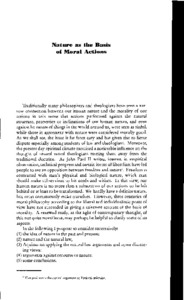Por favor, use este identificador para citar o enlazar este ítem:
https://repositorio.uca.edu.ar/handle/123456789/12632| Campo DC | Valor | Lengua/Idioma |
|---|---|---|
| dc.contributor.author | Elders, Leo J. | es |
| dc.date.accessioned | 2021-10-29T11:42:26Z | - |
| dc.date.available | 2021-10-29T11:42:26Z | - |
| dc.date.issued | 2001 | - |
| dc.identifier.citation | Elders, L. J. Nature as the basis of moral actions [en línea]. Sapientia. 2001, 56 (210). Disponible en: https://repositorio.uca.edu.ar/handle/123456789/12632 | es |
| dc.identifier.issn | 0036-4703 (impreso) | - |
| dc.identifier.issn | 0036-4703 (on line) | - |
| dc.identifier.uri | https://repositorio.uca.edu.ar/handle/123456789/12632 | - |
| dc.description.abstract | Abstract: Traditionally many philosophers and theologians have seen a narrow connection between our human nature and the morality of our actions in this sense that actions performed against the natural structure, properties or inclinations of our human nature, and even against he nature of things in the world around us, were seen as sinful, while those in agreement with nature were considered morally good. As we shall see, the issue is far from easy and has given rise to fierce dispute especially among students of law and theologians. Moreover, the present day spiritual climate exercised a noticeable influence on the thought of several moral theologians turning them away from the traditional doctrine. As John Paul II writes, interest in empirical observation, technical progress and certain forms of liberalism have led people to see an opposition between freedom and naturel. Freedom is contrasted with man's physical and biological nature, which man should make subservient to his needs and wishes. In this view, our human nature is no more than a substratum of our actions to be left behind or at least to be transformed. We hardly have a definite nature, but must continuously make ourselves. However, three centuries of moral philosophy according to the liberal and individualistic point of view have not succeeded in giving a coherent account of the basis of morality. A renewed study, in the light of contemporary thought, of this not quite novel issue, may perhaps be helpful to clarify some of its aspects. | es |
| dc.format | application/pdf | es |
| dc.language.iso | eng | es |
| dc.publisher | Pontificia Universidad Católica Argentina. Facultad de Filosofía y Letras | es |
| dc.rights | Acceso abierto | * |
| dc.rights.uri | http://creativecommons.org/licenses/by-nc-sa/4.0/ | * |
| dc.source | Sapientia. 2001, 56 (210) | es |
| dc.subject | NATURALEZA HUMANA | es |
| dc.subject | MORALIDAD | es |
| dc.subject | FILOSOFIA TEOLOGICA | es |
| dc.subject | FILOSOFIA MORAL | es |
| dc.subject | PENSAMIENTO FILOSOFICO | es |
| dc.subject | FILOSOFIA CONTEMPORANEA | es |
| dc.title | Nature as the basis of moral actions | es |
| dc.type | Artículo | es |
| uca.disciplina | FILOSOFIA | es |
| uca.issnrd | 1 | es |
| uca.affiliation | Fil: Elders, Leo J. Gustav Siewerth Academy; Alemania | es |
| uca.version | publishedVersion | es |
| item.grantfulltext | open | - |
| item.fulltext | With Fulltext | - |
| item.languageiso639-1 | en | - |
| Aparece en las colecciones: | SAP - 2001 Vol LVI nro. 210 | |
Ficheros en este ítem:
| Fichero | Descripción | Tamaño | Formato | |
|---|---|---|---|---|
| nature-baseis-moral.pdf | 327,95 kB | Adobe PDF |  Visualizar/Abrir |
Visualizaciones de página(s)
38
comprobado en 27-abr-2024
Descarga(s)
65
comprobado en 27-abr-2024
Google ScholarTM
Ver en Google Scholar
Este ítem está sujeto a una Licencia Creative Commons

